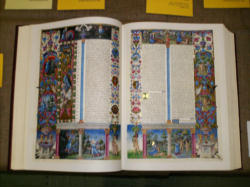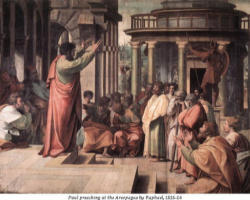 All Scripture is inspired by God. The Greek means God-breathed.
All Scripture is inspired by God. The Greek means God-breathed.
The early Christians received the scripture as a gift. They knew that the Sacred words were to lead to a deeper communion of love with their source, the Living Word of God. Early theologians were mystics. The Bible is an invitation into an encounter with God for every Christian. Its words are not a formula to obtain “success” in life, but an invitation into a communion of Love and a new way of living. The Bible is not some-thing, but reveals “Someone”. In the words of St. Paul to Timothy, all Scripture is “inspired” by God. The Greek means “God-breathed”.
There is a wonderful renewal of a love for the Bible spreading throughout the Catholic Church. I recently taught an adult faith formation class in my parish which reaffirmed this fact. I was moved by the number of people who came and the depth of the hunger in their hearts. They wanted a deeper relationship with the Lord. That hunger is increasing everywhere I look. People are turning to the One who offers the meaning of Life itself and communicates Himself to us. One of the ways that happens is through the Bible, the Sacred Scripture.
In “The Word of God” (Dei Verbum in Latin), a teaching document from the Second Vatican Council we read, “(I)n the sacred books, the Father who is in heaven meets His children with great love and speaks with them; and the force and power in the word of God is so great that it stands as the support and energy of the Church, the strength of faith for her sons, the food of the soul, the pure and everlasting source of spiritual life” (On the Word of God, Second Vatican Council, Paragraph 21)
Several years ago I read of a gathering of scripture scholars held in Rome at the Pontifical Biblical Institute. The group sought what they called a “kneeling exegesis”. Exegesis is a word which refers to the study of the bible. It has taken turns in the last 100 years, some good and some bad. I loved the phrase “kneeling exegesis”. It reminded me of what should be obvious, but sadly is not; only through prayer can we encounter the living Word of God in the Bible.
The Bible is at the heart of the Church’s worship, faith and life. It is the “Book of the Church.” Christianity is not about “me and Jesus” but me in Jesus. Through Baptism we come to live in His Body, the Church. When God chose to reveal Himself He did not throw a book out of heaven. Rather, the Word was made Flesh. Through the Incarnation – which includes the entirety of the life, suffering, death, resurrection and ascension of Jesus Christ- a new creation began. We are now incorporated into Christ when we are baptized into His Church and we enter into the lived experience of that new Creation.
The Church is not an organizational afterthought we put together. It is the plan of God for the salvation of the entire human race. The Church is the Body of the Risen Christ and the seed of the kingdom to come. The Church is the new family into which we are reborn through the womb of Baptismal font. In the Church we can live our lives in Him, with one another, for the sake of the world. She is the home of the whole human race. Through baptism into His death and resurrection all men and women can become sons (and daughters) in the Son.
God has entrusted the Bible to this Church. It was first received by the early Church in the form of the Old Testament books, the Gospels and the letters of the apostles that were “circulated” (that is what the word “encyclical” means) among the early Christian communities. Later, the Canon” (“measuring stick”), was finalized within the Church. It is intended to govern her life and worship. It is the guide for her in carrying forward the redemptive work of Jesus on earth until He comes again.
The Bible is an invitation into an encounter with God for every Christian. Its words are not a formula to obtain “success” in life, but an invitation into a communion of Love and a new way of living. The Bible is not some-thing, but reveals “Someone”. In the words of St. Paul to Timothy, all Scripture is “inspired” by God. The Greek means “God-breathed”.
As a young man, I searched for meaning and purpose in my life beyond the emptiness and materialism of the age. My search eventually they led to an encounter with the One who is the “Way, the Truth and the Life” and home to the Catholic faith. One of the first fruits of this encounter was an unquenchable attraction to the Bible. I wanted to understand it its meaning for my life. I spent nearly two years in a Benedictine Monastery where I began reading the Fathers of the Church and practicing what is called “Lectio Divina”.
The early Christians received the scripture as a gift. They knew that the Sacred words were to lead to a deeper communion of love with their source, the Living Word of God. Early theologians were mystics. My favorite definition of a theologian is from the Monk Evagrius of Pontus, someone who “rests his head on the chest of Christ.” The image calls to mind the beloved disciple, John, depicted as doing just that in early Christian art. It also speaks of the prerequisite for fruitful study of the Bible, a relationship with the Lord in prayer.
Early Christians viewed the reading of Scripture as a way of encountering the Living Word, who gives Himself as bread to those who feed on this written Word. This practice is kept alive in the Christian monastic tradition, particularly among Benedictines in the West. It is embedded in the Eastern Christian tradition and especially evident in the writings of the early Church fathers. They wrote in a sort of stream of scriptural consciousness, moving from inspired thoughts to actual biblical quotes and back; most often without any reference to the specific “chapter and verse”. The text was living within them. To use a phrase from my childhood they “knew it by heart.”
This way of encountering the Lord in His Word can be cultivated in our lives. It involves meeting the Lord in His word and being changed, converted, in that encounter. It can inform a rhythmic way of life steeped in the practice of the presence of God throughout the day. Participation in the rich and beautiful pattern of the Liturgical life of the Church, filled as it is with the Biblical texts that are arranged for the faithful daily, helps to develop this rhythm.
In the prologue to his “rule”, Benedict of Nursia offered to help monks hear God’s words with the “ear of our heart.” This relational approach is referred to in Western writings as “Lectio Divina”, “What, dear brothers, is more delightful than this voice of the Lord calling to us? See how the Lord in his love shows us the way of life. Clothed then with faith and the performance of good works, let us set out on this way, with the Gospel for our guide – that we may deserve to see him who has called us to his kingdom.” (1 Thess 2:12). The steps of “Lectio Divina” are Listening, Contemplating, Praying and then Resting in the Word.
Listening
Mother Teresa wrote: “God is the friend of silence, in that silence he will listen to us; there he will speak to our soul, and there we will hear his voice. The fruit of silence is faith. The fruit of faith is prayer, the fruit of prayer is love, the fruit of love is service and the fruit of service is silence. In the silence of the heart God speaks. If you face God in prayer and silence, God will speak to you.. God is the friend of silence. His language is silence. ‘Be still and know that I am God’.”
The first step of Lectio Divina is to “hear”. This is done through “lectio” or reading the biblical text and listening. This kind of reading is not like what one does with a newspaper or a book. It is done “in the Spirit”, in prayerful reverence, in the grace of the encounter, learning to listen in silence. It is done from prayer, in prayer and for prayer. “Lectio” is listening for that whisper of God for us this day, that daily bread on the trail of our life.
Meditating
Once we read and hear the text, we meditate on that word or passage, realizing that the breath of God is in that wonderful Bread of Life. The same breath through which God breathed His life into Adam, that same breath that was breathed by Jesus Christ, after His Resurrection, upon His disciples, is present in this wonderful treasure of His written word. When we meditate upon the word we can breathe in the very life of God.
Praying
Now, in relationship with the word we have read and meditated upon, we pray. We converse with the Lord. We offer ourselves to God, pouring ourselves out, with absolute honesty, holding nothing back. We consecrate ourselves, setting ourselves aside and telling the Lord that He is our all in all, our love, the first and the last, the beginning and the end. We make ourselves transparent and honest, offering our pain, our brokenness, our failings; we give ourselves to the One who has given Himself to us. We enter into a holy exchange. Then contemplation begins.
Resting
In love with God, filled with His word, we now rest in His presence, like the beloved disciple John did at the table, placing our heads on the Lords chest, overjoyed to be with Jesus. Our intimacy with the Lord is a relationship where words are no longer even necessary. Nothing needs to be said because we are now in the loving embrace of the Living God. In Him we are changed, converted, transformed by love, instructed and awakened.
This is how we can fall in love with the Bible – by Falling in Love with Jesus the Lord who is the Living Word.

